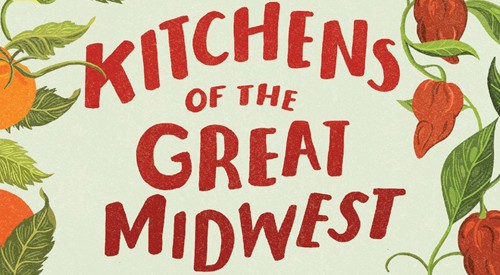Books & Culture
Body and Soul: Kitchens of the Great Midwest by J. Ryan Stradal

Eva Thorvald, age eleven, is a misfit, wearing her very “feminine” battling eagles dress to sell homegrown habanero chili oil to a Mexican restaurant. Eva Thorvald, age 16, is a Goth chick with Doc Martens to match her hair (“bright red Manic Panic”) and she steamrolls a first date by having a tableside ingredients quiz with the chef of the restaurant. And Eva Thorvald at age 20 is a guileless, sharp, prodigious ingénue, one of those people with inborn guiding power. From the first, she has a thing you cannot learn.
One thing about truly inhabiting a city — any city, but especially a small city — is that everyone you meet is somehow, you come to realize, a fixture in all the places you like the best. This is a particular reality in the states sampled in J. Ryan Stradal’s Kitchens of the Great Midwest, which is humble and yet an epic. Nearly everyone we meet, we meet more than once, and freshly plated each time. The common ingredient, of course, is Stradal’s ingénue, though you get the impression Eva would prefer you didn’t know that. In the awkward teenage chapter “Walleye,” her awkward teenage date draws a chef to their table by repeating Eva’s observation that her fish entrée was heavy on rosemary to a waitress. “You perceived the rosemary, which isn’t even on the plate,” the chef says to Eva. Through most of Kitchens, you get the impression that Eva would rather be the rosemary than the walleye.
Really it’s an apt attitude to take, because the people in this novel tend to fall just slightly off center from the culinary whims and preferences that govern them. This is a food novel that’s not really about the making of food, or even about anybody’s physical kitchens. Instead Stradal focuses on the way that food culture has branched and merged and jumped off from certain traditional and, yes, Midwestern commonalities. The way one generation’s knowledge has enabled another to do better, to think more deeply, to begin to understand the most mundane and systematic impulse — to sustain — as a thing that, for a certain set, turns transcendent.
It can be as small as, let’s say, tomatoes. Eva first gets hold of tomatoes at four months old when her father asks a new guy at the farm stand for some Roma VFs. “I don’t sell anything like a Roma VF,” the grower says, “I sell tomatoes.” This is 1989; unfamiliar San Marzanos are suggested to Lars, who asks what a Roma VF could be if not a tomato. “Made in a lab by scientists,” says the grower. It’s the Midwest, so he’s not smug; he’s saying facts. Twenty years later Eva goes to a party and — with the same impulse toward a benign and, in Eva’s case, naïve dispensation of truths — tells a fellow-guest almost a decade her senior that that woman’s favorite early growth heirloom is actually a hybrid owned by Monsanto. By this time, of course, no one’s using San Marzanos anymore. “Aren’t there much better paste tomatoes now?” Eva offhandedly comments. Offhand, she lists four. Her audience at this dinner party is, by turns and in stages, annoyed, confused, and enthralled by her. Eva Thorvald, age 20, has the palate of a master chef, the self-education of a prodigy, and the social graces of…a 20-year-old. This is a young woman who could only thrive, culinary genius or no, in the Midwest.
The party ends up being the first in a series of Sunday Night Dinners that she’s invited to, and the first in a series of links and inversions that twine back to her life with her father. Lars Thorvald was a chef in the Twin Cities, at a trendy and forward restaurant that keeps its reputation into Eva’s young adulthood. And culinary, if not particularly fatherly lessons seep into baby Eva’s modeling-clay brain. Lars proves he’s eating veggies in ’89 by referencing a decadent Caesar salad from a “snooty” Cities restaurant; in ’09 at that inaugural Sunday Night Dinner, Eva makes one tableside that elicits swoons. Father has elaborate plans to feed his twelve-week-old baby a puréed pork shoulder (or should it be a demi-glace?), and his Millennial daughter goes on to make a dry-cured amuse-bouche version for guests who have paid not-small fortunes to taste her fares. It’s a neat trick, maybe, but it tells a truth without having to tell it: Food connects. You need little else.
The New York magazine food critic Gael Greene published a memoir called Insatiable: Tales from a Life of Delicious Excess in 2006, and you get the impression that the 82-year-old will never be, and doesn’t want to be, sated. This is a woman with a deep and unerring and sensual understanding of the ways food nourishes a body beyond the intestines. The best of her trysts is with a famous French country chef with only four English phrases: “‘Thank you,’ ‘Hello,’ ‘I love you,’ ‘More butter.’” Food connects.
While much is made of where food physically originates in Kitchens of the Great Midwest, you come to know that for Stradal, origin means something grander. Because origin, in that part of the world, can be a vanishing point; though physically far, it’s Gertrude Stein in Oakland. Eva’s beloved cousin tells a stranger toward the end of the book that they two are from the same place: “A place that’s gone.” When you work in a kitchen, you’re a misfit, a Goth chick, an ingénue, all at once. This is your place, your point of origin. You make a family from what you have, like you’d piece a meal from the dregs of a foreign fridge. From the kitchen springs all the rest: passion, ingenuity, intellect, sex. You need little else.









